Top APIs for Scalable Email Infrastructure
If you're looking to scale your email operations - whether for marketing, transactional emails, or cold outreach - choosing the right email API is critical. Here's a quick breakdown of the top options:
- Infraforge: Designed for cold outreach with features like dedicated IPs, automated DNS setup, pre-warmed domains, and mailbox management. Pricing starts at $40/month for 10 mailboxes.
- SendGrid: Handles high-volume transactional emails with global infrastructure and compliance certifications. Pricing begins at $19.95/month for 50,000 emails.
- Mailgun: Developer-friendly API with advanced routing, email validation, and analytics. Plans start at $35/month for 50,000 emails.
- Mailtrap: Best for testing environments, offering sandbox tools to simulate email workflows. Starts at $10.99/month.
- Resend: Focused on real-time scaling for fluctuating email volumes. Pricing starts at $20/month.
Each API has strengths tailored to specific needs. Infraforge excels in cold outreach, while SendGrid and Mailgun are ideal for transactional scaling. Mailtrap is perfect for testing, and Resend simplifies dynamic scaling. Below is a quick comparison to help you decide.
Quick Comparison
| Provider | Best For | Monthly Volume Capacity | Key Features | Starting Price (USD) |
|---|---|---|---|---|
| Infraforge | Cold outreach | Thousands of domains | Dedicated IPs, pre-warmed domains, automation | $40/month (10 mailboxes) |
| SendGrid | Transactional emails | 100+ billion/month | Deliverability insights, compliance tools | $19.95/month (50,000 emails) |
| Mailgun | Developer workflows | 15 million/hour | Advanced routing, analytics, validation | $35/month (50,000 emails) |
| Mailtrap | Testing environments | High-volume capable | Sandbox testing, expert support | $10.99/month |
| Resend | Dynamic scaling | Variable | Real-time IP adjustment, simple API | $20/month |
For cold outreach, Infraforge offers unmatched control and automation. For transactional and high-volume needs, SendGrid and Mailgun provide reliable options. Choose the API that aligns with your business goals and technical requirements.
Infraforge: Private Email Infrastructure
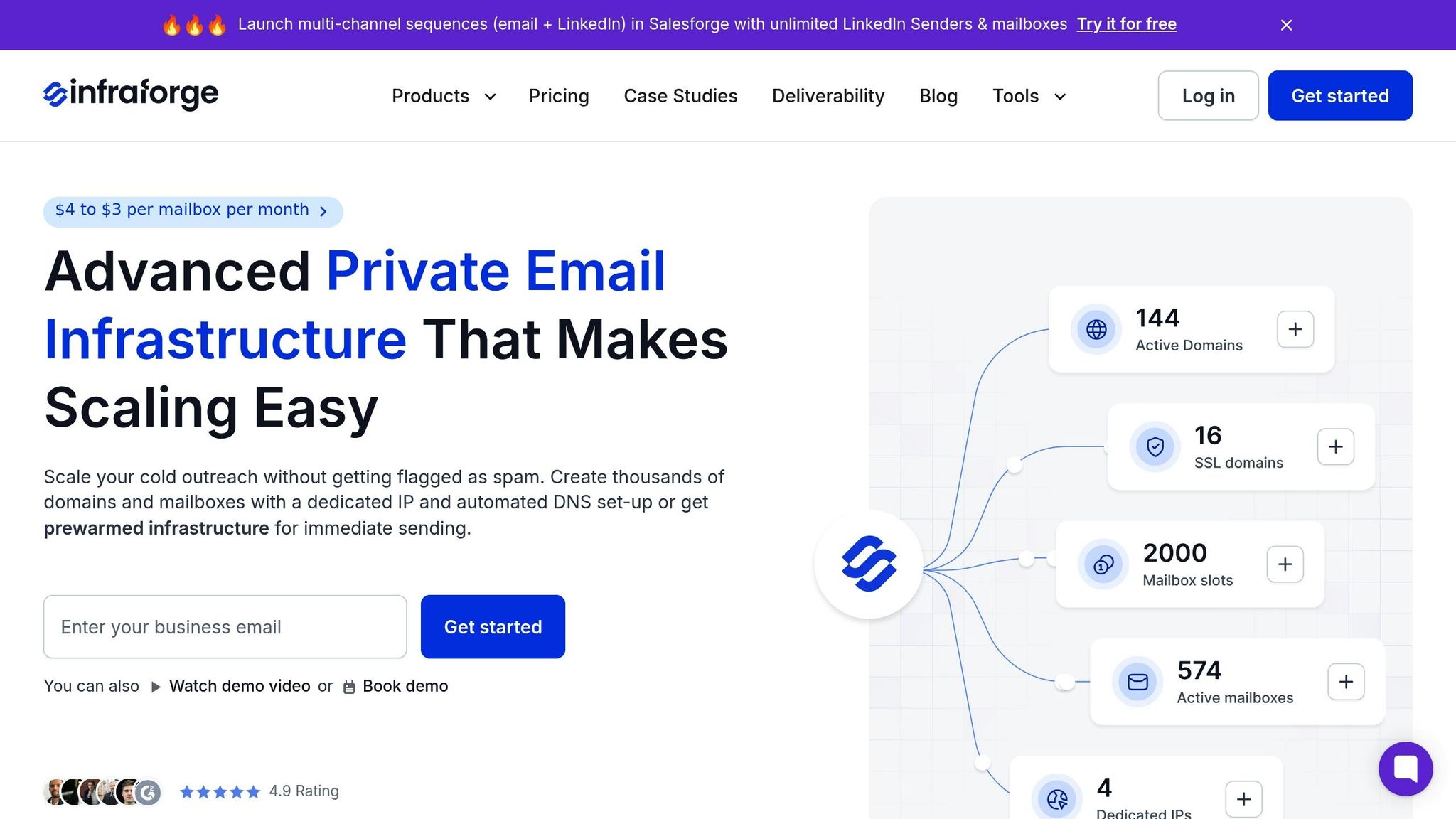
Infraforge is designed specifically for businesses that rely on large-scale cold email outreach. Unlike general-purpose email APIs, which cater to a broad range of transactional needs, Infraforge zeroes in on the unique challenges of cold outreach - where sender reputation and deliverability are the keys to success.
For many U.S. businesses, scaling cold email campaigns comes with a major hurdle: maintaining high deliverability while juggling thousands of domains and mailboxes. Platforms like Gmail or Outlook aren't built for this kind of high-volume operation, often leading to spam issues or flagged accounts. Infraforge tackles this head-on with features tailored to meet these demands. Let’s break down what makes this platform stand out, its seamless integration with The Forge Stack, and its cost advantages for U.S. businesses.
Infraforge Features
Infraforge offers a robust suite of tools designed to simplify and scale cold outreach efforts. Here’s how it delivers:
- Dedicated IP Addresses: Each client gets their own IPs, ensuring your sender reputation isn’t influenced by others. This is critical for businesses managing large campaigns.
- Automated DNS Setup: Configures DMARC, SPF, DKIM, and domain tracking automatically, cutting setup time to just five minutes for your first domain and mailbox.
- Pre-Warmed Domains and Mailboxes: Skip the usual warm-up period and start sending right away, speeding up your outreach efforts.
- SSL and Domain Masking: Adds a layer of security and helps maintain sender reputation by avoiding blacklisting.
- Multi-IP Provisioning: Distributes email volume across multiple IPs, further improving deliverability and safeguarding sender reputation.
- Real-Time Alerts: Keeps you in the loop on campaign performance, so you can make adjustments as needed.
- API for Programmatic Scaling: Automates mailbox provisioning, domain management, and monitoring, making it easier to scale operations.
- Masterbox: Provides a centralized view of emails across all accounts in a workspace.
- Bulk DNS Updates: Simplifies the management of multiple domains at once.
These features allow businesses to focus on outreach strategy without getting bogged down by technical hurdles.
Integration with The Forge Stack
Infraforge doesn’t operate in isolation. It integrates seamlessly with other tools in The Forge Stack, creating a unified ecosystem for outreach. Here’s what that looks like:
- Salesforge: Combine email and LinkedIn outreach with AI-driven SDRs.
- Mailforge: Share email infrastructure effortlessly.
- Warmforge: Optimize deliverability and warm-up processes.
- Primeforge: Manage Google Workspace and Microsoft 365 mailboxes.
- Leadsforge: Streamline lead generation.
With these integrations, businesses can manage multi-channel outreach and automate sequences directly within Salesforge. A unified dashboard simplifies domain and mailbox management while ensuring compatibility with existing CRM systems and growth tools.
"During my time at a Fortune 500 company and now across all our products, Infraforge has been my go-to solution for Email Infrastructure. Its deliverability and impact are unmatched. If you're serious about outreach and want the best tool in the market, Infraforge is the only choice."
- Rahul Lakhaney, Former VP at Gartner, now CEO at Enrich.so and Maximise
From automated DNS setup to reply monitoring and performance optimization, Infraforge eliminates the need for juggling multiple tools. The data flows seamlessly between functions, making outreach more efficient and effective.
Pricing and US Business Benefits
Infraforge offers competitive pricing that’s particularly attractive for U.S. businesses. Plans start at $40/month for 10 mailboxes (billed quarterly) or $33/month with an annual plan. Domain costs depend on the TLD, with five ".com" domains priced at $70 per year.
For businesses needing 200 mailboxes, Infraforge costs about $651 per month, which is significantly lower than Google Workspace ($1,680 per month) or Microsoft 365 ($1,200 per month) for the same volume. This includes automated DNS setup, hosting, and mailbox maintenance.
Add-ons are available for enhanced functionality:
- SSL & Domain Masking: $2 per domain per month (quarterly) or $6 per domain per year (annual).
- IP Addresses: $99 per IP per month.
- Masterbox: $7 per workspace per month (annual) or $9 per workspace per month (quarterly).
Compliance is another strong point. Infraforge supports opt-out management, sender authentication (SPF, DKIM, DMARC), and secure data handling. Features like audit trails and access controls align with U.S. enterprise security standards, helping businesses meet CAN-SPAM requirements with ease.
"The ease of use and simplicity make managing email infrastructure a breeze, and the pricing is spot on - far more reasonable than some of the other options."
- Anton L, Founder
With a 4.9 user rating, Infraforge consistently earns praise for its ease of use, deliverability performance, and responsive support. It’s a reliable choice for businesses looking to scale cold outreach while staying compliant and cost-effective.
Other Email Infrastructure APIs
While Infraforge shines in cold outreach infrastructure, there are several other APIs designed to meet a variety of email-related needs. Each platform has its own strengths, making them excellent complements to Infraforge for different operational requirements. Here's a closer look at some notable alternatives and what they bring to the table.
Mailgun: Built for Developers
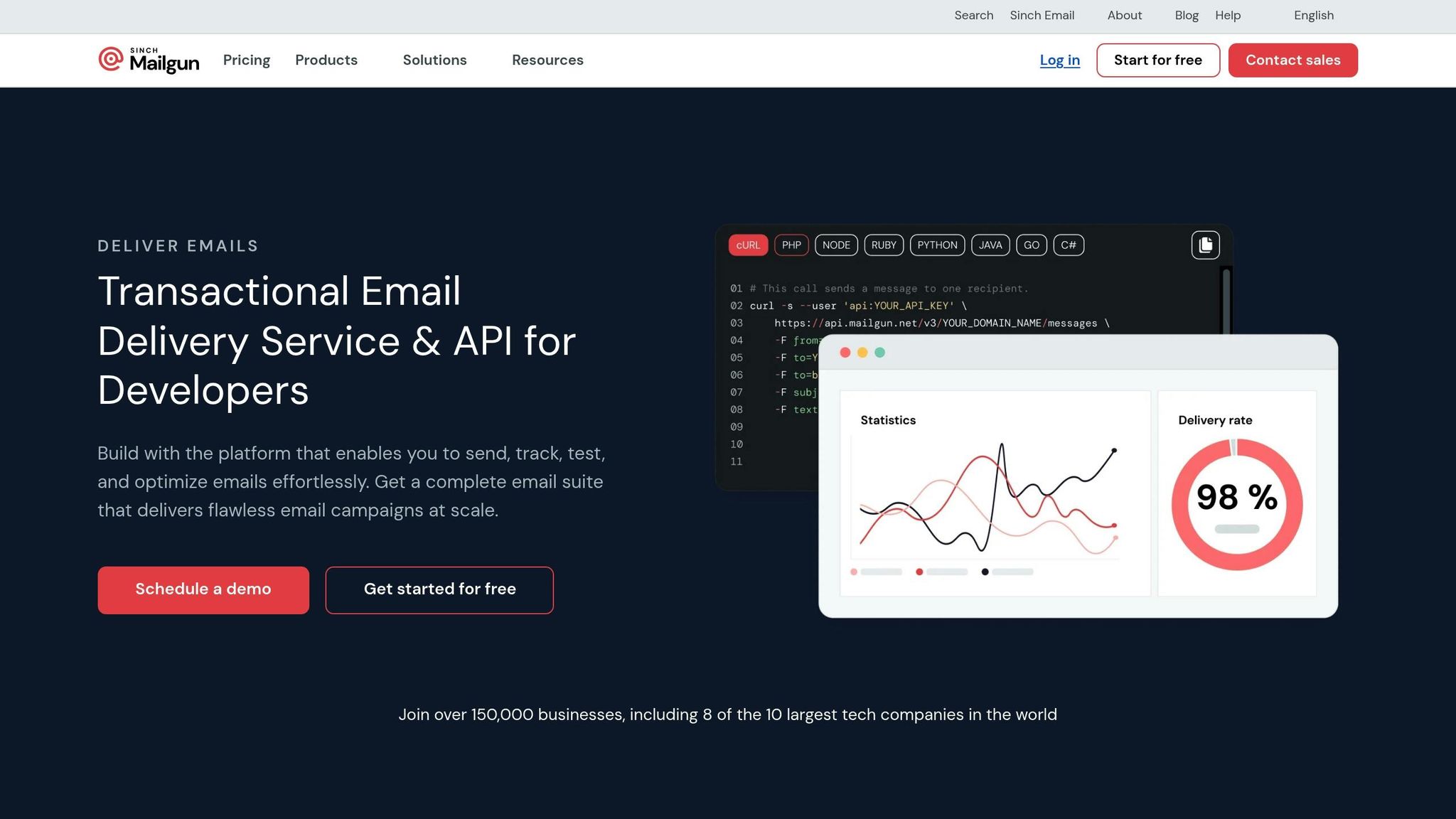
Often referred to as the "Linux of email APIs", Mailgun is a favorite among developers for its flexibility and customization options. It offers both REST API and SMTP relay capabilities, allowing seamless integration into various systems.
One of its standout features is advanced routing logic, which lets teams set up custom rules for email delivery. Additionally, real-time validation tools help maintain clean email lists, reducing bounce rates. The analytics dashboard provides detailed insights into delivery rates, opens, clicks, and bounces, making it easier to refine campaigns over time.
For US-based teams managing complex workflows, Mailgun’s dedicated IP addresses and granular controls are a big plus. With the capacity to handle up to 15 million emails per hour under its Rapid Fire Delivery SLA, it’s a solid choice for high-volume operations. Integration is simplified with SDKs available for major programming languages.
Mailgun offers a free tier for 5,000 emails per month during the first 30 days. Afterward, the Foundation plan starts at $35 per month for 50,000 emails, with additional usage billed on a pay-per-use basis. However, the platform's complexity can be a hurdle, as it requires technical expertise to fully utilize, and the quality of customer support varies by plan tier.
SendGrid: A High-Volume Powerhouse
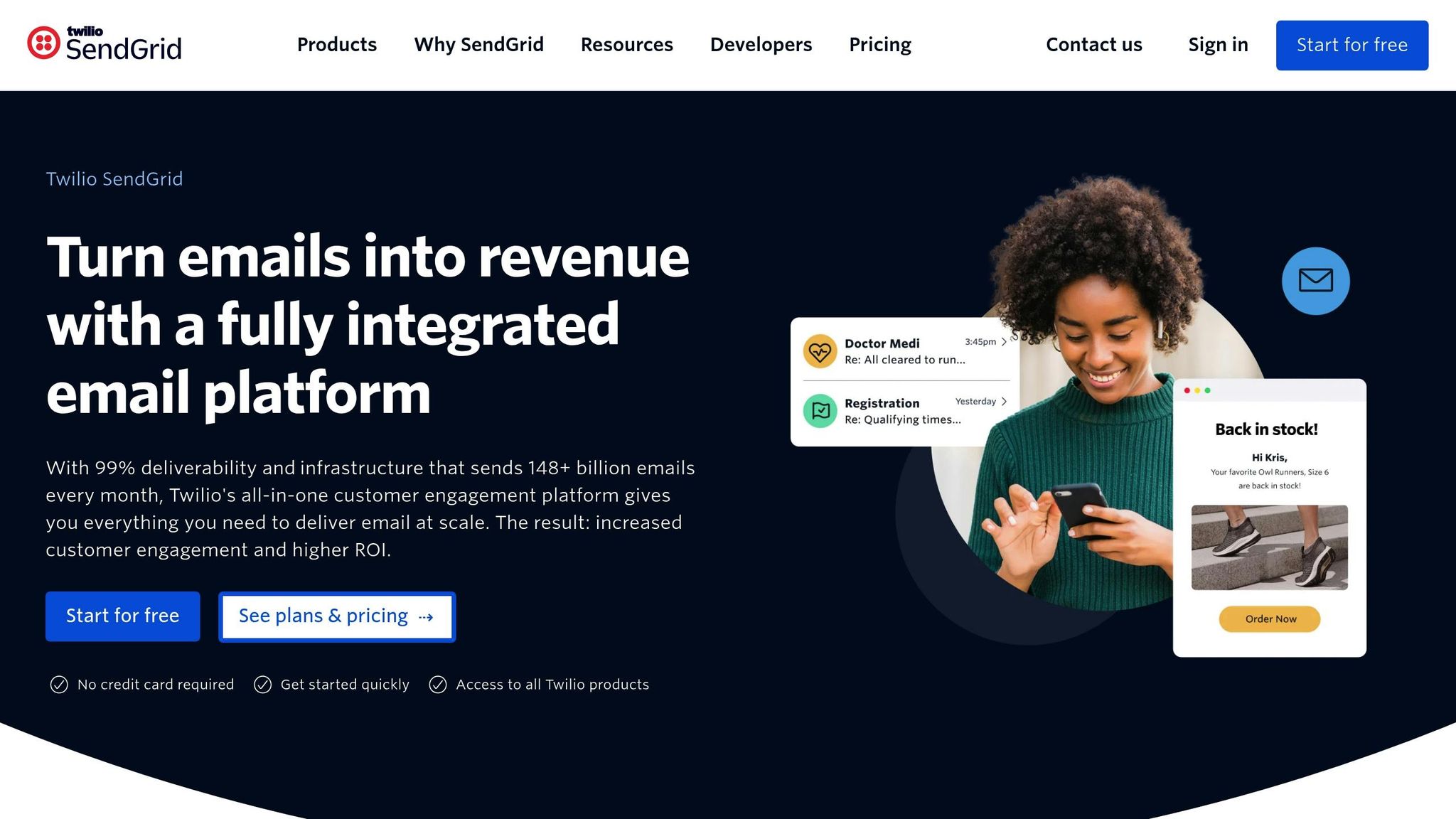
Processing over 100 billion emails every month, SendGrid is a leader in high-volume email delivery. Its global infrastructure ensures reliable performance, even at scale.
One key feature is its deliverability insights, which help teams understand inbox placement rates and address potential issues before they escalate. SendGrid also provides IP management tools, enabling businesses to maintain separate IP pools for different email types, which protects sender reputation.
For US businesses in regulated industries, SendGrid’s compliance certifications are a major asset. With SOC 2, ISO 27001, and HIPAA certifications, it meets rigorous security and privacy standards. This makes it a go-to choice for industries like healthcare and finance.
SendGrid’s free plan includes 100 emails per day for 60 days, with paid plans starting at $19.95 per month for 50,000 emails. However, advanced features like dedicated IPs and premium support are only available on higher-tier plans, which can become costly for growing businesses.
Users rate SendGrid highly, with a 4.0/5 on G2 and 4.2/5 on Capterra, praising its scalability and deliverability. That said, the interface can be challenging for non-developers, and lower-tier plans come with limited customer support.
Mailtrap: Designed for Testing
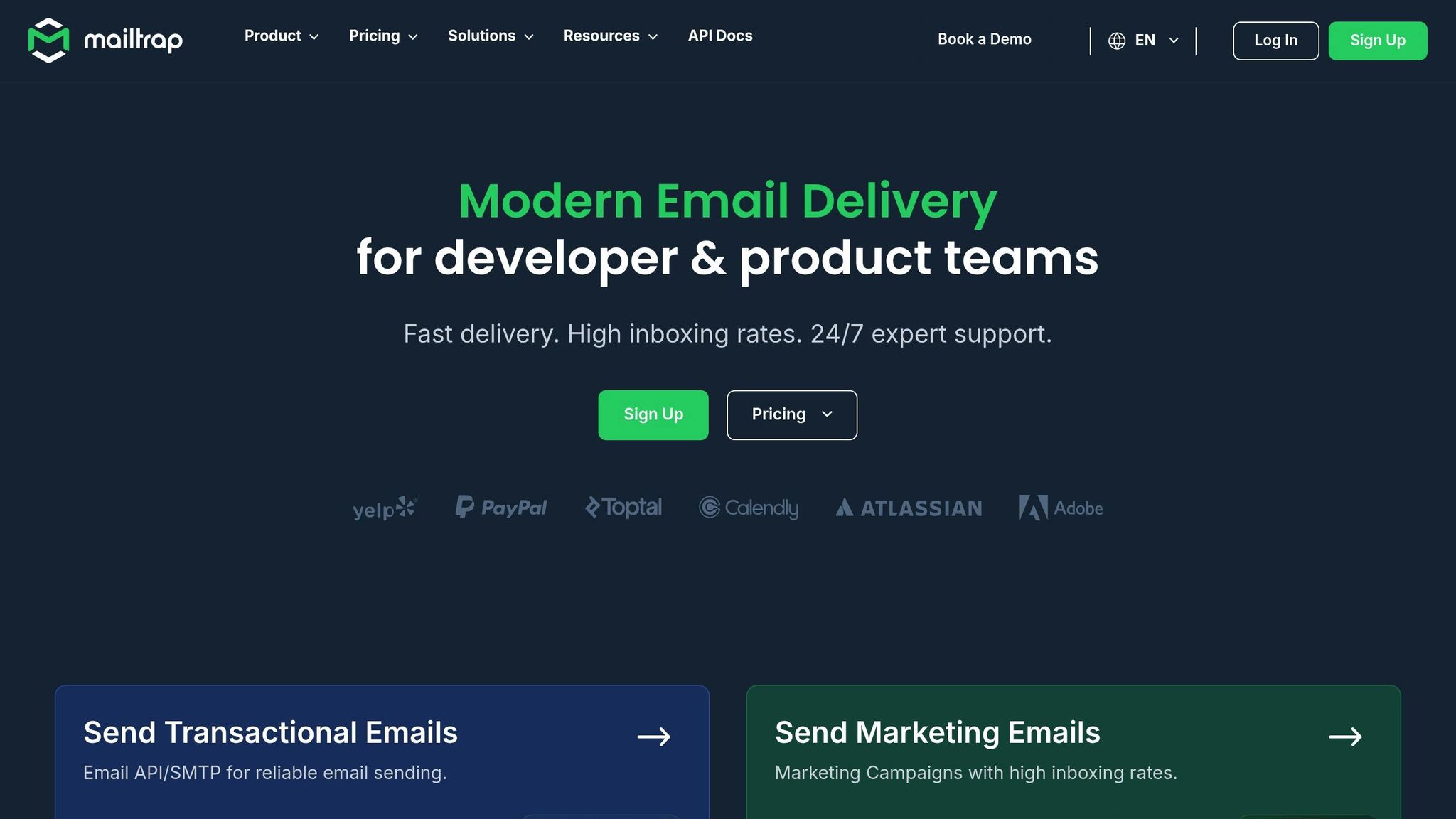
Mailtrap is specifically built for development and testing environments, offering a safe sandbox for teams to test email workflows without risking production deliverability or accidentally sending emails to real recipients.
The platform uses multiple Mail Transfer Agents (MTAs) to distribute email load efficiently. Additionally, its deliverability experts provide guidance for custom setups, a rare feature among email API providers. This makes it particularly useful for US teams scaling quickly and seeking optimized configurations from the outset.
Mailtrap’s advanced webhooks and testing tools allow developers to simulate various scenarios and troubleshoot issues before going live. It supports both testing and production environments, streamlining workflows across development stages.
While pricing details aren’t widely available, Mailtrap is geared toward high-volume and enterprise use cases. However, its focus on testing means it lacks robust marketing features, making it less ideal for businesses seeking a comprehensive email marketing solution.
Resend: Built for Growth
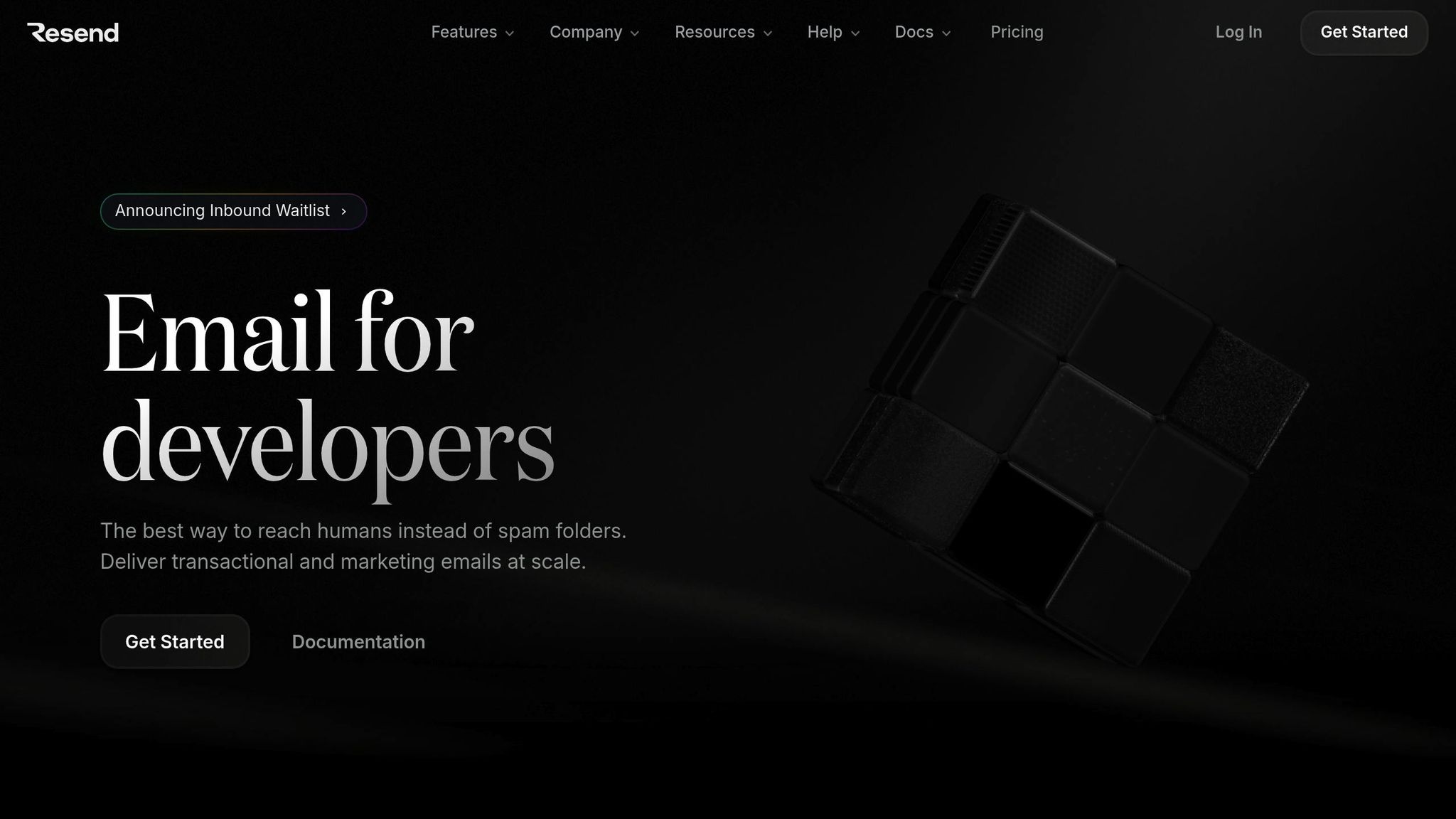
Resend is a modern email API designed for businesses experiencing rapid growth or fluctuating email volumes. Its real-time IP adjustment and dynamic cloud scaling capabilities automatically adapt to changes in email traffic, ensuring efficiency and cost-effectiveness.
With a RESTful API and clear documentation, Resend simplifies implementation, making it appealing to fast-growing US businesses that need to deploy email functionality quickly.
The platform’s dynamic infrastructure scales up during busy periods and down during quieter times, offering potential cost savings for businesses with seasonal or unpredictable email needs. However, Resend lacks some advanced features like dedicated streams for separating email types or built-in testing environments like those offered by Mailtrap. Teams may need to integrate additional tools to fill these gaps.
Resend is ideal for companies prioritizing ease of use and automatic infrastructure management over granular control or advanced functionality.
| Provider | Best For | Monthly Volume Capacity | Key Strength | Main Limitation |
|---|---|---|---|---|
| Mailgun | Custom routing, developer control | 15 million/hour | Advanced configurability | Steep learning curve |
| SendGrid | High-volume, compliance needs | 100+ billion/month | Enterprise certifications | Advanced features cost extra |
| Mailtrap | Testing, rapid scaling | High-volume capable | Expert configuration support | Limited marketing features |
| Resend | Variable volume, fast growth | Dynamic scaling | Real-time infrastructure adjustment | Lacks some advanced features |
Each of these APIs has its own strengths, making them valuable for specific use cases. However, when it comes to scalable cold email outreach, Infraforge remains a top choice for US-based businesses.
API Comparison Table
Here's a detailed side-by-side comparison of top email APIs, focusing on scalability, automation, and pricing for US-based businesses.
| Provider | Scalability | Dedicated IPs | DNS Automation | Deliverability Tools | Integration Options | Pricing (USD) | Key Features |
|---|---|---|---|---|---|---|---|
| Infraforge | Very High (thousands of domains/mailboxes) | Yes (per mailbox) | Full automation | Pre-warmed domains/mailboxes, automated warmup, real-time monitoring | API, Forge Stack integration | $3–4/mailbox/month | Private infrastructure, SSL/domain masking, multi-IP provisioning |
| SendGrid | Very High (100B emails/month) | Yes (higher plans) | Partial (manual setup) | Deliverability insights, validation | SDKs, REST API | Starting at $19.95/month+ | Global infrastructure, compliance certifications |
| Mailgun | Very High (15M emails/hour) | Yes | Partial | Inbox placement testing, email validation, analytics | SDKs, REST API | Starting at $35/month+ | Rapid Fire SLA, advanced routing |
| Mailtrap | High | No | No | Sandbox testing, deliverability support | SDKs, REST API | Starting at $10.99/month+ | Testing environments, expert support |
| Resend | High (dynamic scaling) | Yes | No | Basic monitoring | SDKs, REST API | Starting at $20/month+ | Real-time IP adjustment, simple API |
This comparison highlights differences in features and pricing, helping businesses choose the right fit for their needs.
Infraforge stands out with dedicated IPs per mailbox, compared to SendGrid and Mailgun, which primarily include this feature in higher-tier plans. This makes Infraforge a cost-effective choice for businesses scaling their email outreach.
Another key differentiator is DNS automation. Infraforge offers fully automated DNS setup with pre-configured email authentication, reducing technical workload and minimizing setup errors. In contrast, other providers either require manual configuration or offer limited automation.
When it comes to deliverability tools, each platform has its strengths. SendGrid provides in-depth deliverability insights and holds certifications like SOC 2, ISO 27001, and HIPAA, making it a solid choice for enterprise-level compliance. Mailgun offers advanced features like inbox placement testing and email validation, while Infraforge focuses on cold outreach with tools like pre-warmed domains, automated warmup, and real-time monitoring, tailored for outbound sales campaigns.
Integration options are robust across the board, with all platforms supporting RESTful APIs and SDKs for major programming languages. Infraforge goes a step further with native integration into The Forge Stack, enabling seamless multi-channel outreach.
Pricing varies significantly depending on usage. For example, a setup with 200 mailboxes costs approximately $651 per month with Infraforge, compared to $1,200 per month with MS365 or $1,680 per month with Google Workspace. This makes Infraforge a compelling option for businesses prioritizing scalability and automation.
Each API offers unique value. Infraforge excels in cold outreach with its automation and dedicated resources. SendGrid is ideal for enterprises needing global reach and compliance. Mailgun caters to developers with customization options, Mailtrap is perfect for testing workflows, and Resend simplifies scaling with dynamic adjustments. Choose the one that aligns with your business goals and technical needs.
How to Choose the Right Email API
Picking the right email API boils down to understanding what you need it for. Whether you're considering private solutions like Infraforge or shared platforms like SendGrid or Mailgun, the key is aligning the API with your email-sending goals.
For cold outreach campaigns, dedicated infrastructure is a must. Shared IP pools can hurt your sender reputation due to the actions of other users. Private setups, like those offered by Infraforge, give you dedicated IPs, automated warmup processes, and full control over your reputation. These features are essential for cold outreach, where maintaining a strong sender reputation can make or break your efforts.
If your focus is on transactional emails - think order confirmations, password resets, or account notifications - speed and reliability are non-negotiable. SendGrid, for instance, handles over 100 billion emails monthly, proving its capacity for high-volume transactional sending. Mailgun, with its Rapid Fire SLA, guarantees delivery speeds for up to 15 million emails per hour. These platforms ensure your critical messages reach recipients quickly and without fail.
Marketing campaigns, on the other hand, prioritize analytics, template management, and audience segmentation. Shared platforms like SendGrid and Mailtrap shine here with tools for campaign management, A/B testing, and engagement tracking, all of which help refine and optimize your outreach strategies.
When deciding between private and shared infrastructure, it often comes down to control versus convenience. Private solutions like Infraforge provide dedicated resources, automated DNS setup for DMARC, SPF, and DKIM, and are tailored for cold outreach. You get complete control over deliverability and avoid sharing IP reputation with other users.
Shared platforms, however, are ideal for scalability with minimal setup. SendGrid’s enterprise-grade certifications make it a strong option for businesses with stringent compliance needs. That said, shared platforms offer less control over the specifics of your sending environment.
Scalability is another major consideration. Your needs can vary drastically depending on your use case. For example, scaling from hundreds to thousands of mailboxes for cold outreach requires a solution capable of handling bulk DNS updates, multiple workspaces, and programmatic scaling through APIs. Infraforge supports unlimited domains and mailboxes, with automated setups that take just five minutes per workspace. Meanwhile, platforms like SendGrid and Mailgun are built for businesses managing millions of transactional emails, offering seamless volume-based scaling.
Cost is another factor to weigh. Infraforge, for instance, charges around $651/month for 200 mailboxes, which is significantly more affordable than options like Google Workspace or MS365. This can be a game-changer for large-scale cold outreach campaigns.
Integration capabilities are equally important. If you rely on specific CRMs or outreach tools, ensure your chosen API works with them. Infraforge integrates seamlessly with The Forge Stack, including tools like Salesforge for outreach and Warmforge for deliverability management. On the other hand, platforms like SendGrid, Mailgun, and Mailtrap offer SDKs for popular programming languages and webhook support for real-time event tracking, making them ideal for custom applications or automated workflows.
Security and compliance also play a role, especially in industries like healthcare, finance, or legal. Infraforge’s private infrastructure gives you full control over data handling and security, which is crucial for meeting strict regulatory requirements.
Finally, consider your team’s technical skills. If your team is comfortable fine-tuning API settings and managing deliverability, shared platforms might offer the flexibility you need. But if you prefer a solution that’s ready to go out of the box for cold outreach, private infrastructure with built-in optimizations is likely the better fit.
The bottom line? Match the API to your primary goal. Cold outreach thrives on private resources, transactional emails demand speed and reliability, and marketing campaigns benefit from advanced analytics and segmentation. Focus on the API that aligns with your core need instead of trying to find a one-size-fits-all solution.
Conclusion
Building a scalable email infrastructure boils down to two key factors: ensuring deliverability and managing your sender reputation as your business expands. Each email API serves different purposes, so understanding their specific strengths is critical to making the right choice for your business.
For businesses in the U.S. focusing on cold outreach, Infraforge's private infrastructure stands out as a strong option. On the other hand, platforms like SendGrid and Mailgun shine when it comes to transactional and marketing emails, thanks to their speed and reliability. The key is to align the API’s capabilities with your outreach goals - whether that’s dedicated resources for cold outreach, fast delivery for transactional messages, or robust analytics for marketing campaigns.
The ability to integrate smoothly into your existing tech stack is another essential factor. For example, Infraforge offers seamless integration with The Forge Stack, streamlining workflows for outreach teams. Meanwhile, services like SendGrid and Mailgun provide extensive SDKs, making them great for businesses looking to build custom applications. Take the time to evaluate how well an API fits into your current tools and whether it can adapt as your needs evolve.
When it comes to U.S.-based businesses, the choice often boils down to control versus convenience. Private infrastructure, like Infraforge’s, gives you full control over deliverability and compliance - an advantage for industries with strict regulations or high-stakes communication. On the flip side, shared platforms like SendGrid and Mailgun offer easier scalability with less hands-on effort.
While the email infrastructure market continues to change, the basics remain the same: success depends on deliverability, scalability, and seamless integration. Whether you opt for Infraforge for cold outreach, SendGrid for transactional emails, or another platform entirely, make sure it aligns with your specific goals and grows alongside your business.
FAQs
How does Infraforge optimize email deliverability for cold outreach campaigns?
Infraforge takes email deliverability to the next level with tools like dedicated IPs, automated DNS setup, and pre-warmed domains and mailboxes. These features work together to establish credibility with email providers, helping your emails reach inboxes instead of getting stuck in spam folders.
Beyond that, Infraforge employs smart sending limits and sender rotation to replicate natural email patterns. This reduces the chance of triggering spam filters, making it a powerful choice for handling large-scale cold outreach campaigns efficiently.
What’s the difference between private and shared email infrastructure, and which one is right for my business?
Private and shared email infrastructures differ in terms of control, scalability, and how well they ensure emails reach their destination. Private email infrastructure gives businesses access to dedicated IPs, pre-warmed domains, automated DNS configurations, and APIs designed for scaling. This setup is perfect for companies running large-scale outreach campaigns or those focused on achieving reliable email deliverability.
In contrast, shared email infrastructure is a more budget-friendly option, making it ideal for smaller businesses or those just starting out. However, it comes with trade-offs - less control and a higher chance of deliverability issues, especially if other users on the shared IPs engage in spammy practices.
The choice between the two depends on your goals. If maintaining control, scaling efficiently, and ensuring consistent deliverability are top priorities, private infrastructure is the way to go. For businesses with simpler requirements or limited budgets, shared infrastructure can be a practical solution.
What should I look for in an email API to support scalable infrastructure?
When assessing an email API to support scalable infrastructure, focus on features that directly enhance performance and deliverability. Look for options like dedicated IPs, automated DNS configuration, and pre-warmed domains and mailboxes. These tools are essential for ensuring your emails reach inboxes effectively, especially when managing high-volume outreach.
It's also important to choose an API that integrates smoothly with your current tools and supports programmatic scaling. For cold email campaigns, platforms such as Infraforge are designed to offer advanced private email infrastructure, making it easier to handle large-scale outreach without complications.